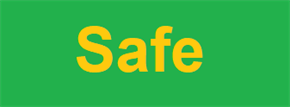The CQC ask the same five key questions to all care services. Are services safe, effective, caring, responsive and well-led?
The key questions are broken down in to further sets of questions called ‘Key Lines of Enquiry’. On this page, you can find more information on Safe.
If you have any further questions, you can speak to your line manager or email: CQC.Group@eastamb.nhs.uk.
By safe, we mean people are protected from abuse* and avoidable harm.
*Abuse can be physical, sexual, mental or psychological, financial, neglect, institutional or discriminatory abuse.
Key Lines of enquiry
- How do systems, processes and practices keep people safe and safeguarded from abuse?
- How are risks to people assessed, and their safety monitored and managed so they are supported to stay safe?
- Do staff have all the information they need to deliver safe care and treatment to people?
- How does the provider ensure the proper and safe use of medicines, where the service is responsible?
- What is the track record on safety?
- Are lessons learned and improvements made when things go wrong?
These key lines of enquiry cover several areas including but not limited to;
- Infection prevention and control – Infection, prevention and control has always been a main priority for the Trust, but in response to the Covid-19 pandemic, systems were enhanced to reflect the increased risk to both patients and staff. This included the provision of additional PPE, enhanced cleaning schedules, implementation of ‘working safely’ guidance and the introduction of covid marshals (Trust wide) alongside regular information items and communication with all staff.
- Medicines – The previous CQC report in 2019 identified several areas for improvement relating to the Trust’s management of medicines. In response, the Trust has introduced a new standardised process for medicines, successfully obtained a controlled drugs licence which means that we can purchase medicines directly from suppliers. We have also introduced online auditing processes to monitor how safely and effectively medicines are stored and managed.
- Safeguarding - Within the previous CQC report (published July 2020) concerns were raised regarding safeguarding systems and processes and the Trust set several actions to address these concerns which formed part of the enforcement notices. As a Trust, we now have improved systems and processes in place to safeguard people from abuse.
- Incidents (including learning from incidents) - The Trust continues to carry out focussed work on serious incident processes including the introduction of increasing openness and transparency through using ‘round table’ discussions. It has also introduced Duty of Candour training for all staff to enhance knowledge around this subject.
- Access to information – The introduction of the new ePCR via iPads has enabled the Trust with an opportunity to provide additional information routes for staff when attending patients. This includes; JRCALC guidelines, clinical apps and patient summary records.
- Health and safety – The Trust has recently signed up to the NHS Premises Assurance Model (PAM) and has undertaken it’s first assessment with submission to NHSE.
There are a number of additional information which is relevant to this key line of enquiry. Please view these pages below by clicking on the titles in bold.
Safeguarding
Cleanliness, Infection Control and Hygiene
Environment and Equipment
Records
Medicines
Incidents
Please note, this page is being continually updated, please check back regularly for the latest information
